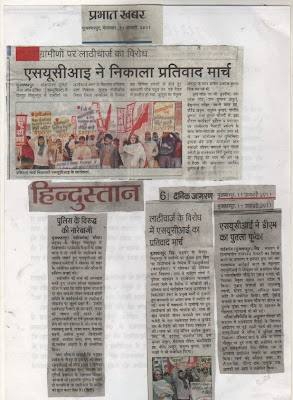



| Asbestos unit plan faces heat Patna: The use of asbestos, the world’s most carcinogenic substance declared by US environmental protection agency, has taken centrestage in Bihar because of all the wrong reasons. The ongoing agitation by people living in and around Chainpur village in Muzaffarpur district where a Calcutta-based company has planned to set up an asbestos cement factory has brought the issue to the fore. The issue has galvanised all sections of the people, be it farmers, farm labourers, students or intellectuals to oppose the construction of the factory under Marwan block of the district. The movement to shelve the asbestos factory has been spearheaded by Socialist Unity Centre of India (Communist) and Ban Asbestos Network of India (Bani) since July last year. The agitation seems to have grabbed international attention as the World Bank and World Health Organisation’s consultant on asbestos, Barry Castleman, has sought the intervention of chief minister Nitish Kumar and Union environment minister Jairam Ramesh in the matter, explaining the fatality of the use of asbestos. Drawing the chief minister’s attention to the ongoing resistance in the district over the plant and the repressive measures taken by the district administration, Castleman, a noted environmental and occupational health expert, said: “All the world’s leading health authorities predict disaster if the next generation of buildings that people live and work in are built with asbestos.” Demanding that the state government should not allow such a quasi-criminal industry in spite of well-founded public objections, he said: “The heedless building of an asbestos-cement products plant in Bihar would be a monstrous tragedy that you would someday deeply regret if you do not listen carefully to the protests and reasons for them.” Castleman had contributed significantly to the passage of the Ban Asbestos in America Act of 2007 in the US. Gopal Krishna, the national convener of Bani, a voluntary organisation working for asbestos-free India, told The Telegraph: “Fifty-two countries across the globe have already banned the use of asbestos in their respective countries and on Thursday, Turkey became the 53rd country to do so. Even the Centre has banned asbestos mining in our country but allowed countries like Canada to dump their asbestos and related products because of political patronage.” Gopal Krishna said: “Massive opposition in Muzaffarpur has stopped the construction work because students have studied about the hazardous impact of asbestos in their Class X and XII syllabi.” According to WHO estimates, more than 1,07,000 people die each year because of asbestos-related lung cancer, mesothelioma and asbestosis resulting from occupational exposures. It has come to light that similar plants have been proposed by Chennai-based Ramco Industries Limited in Bihiya (Bhojpur) and Calcutta-based Utkal Asbestos Industries in Panapur (Vaishali). http://www.telegraphindia.com/1110102/jsp/bihar/story_13379742.jsp |







No comments:
Post a Comment